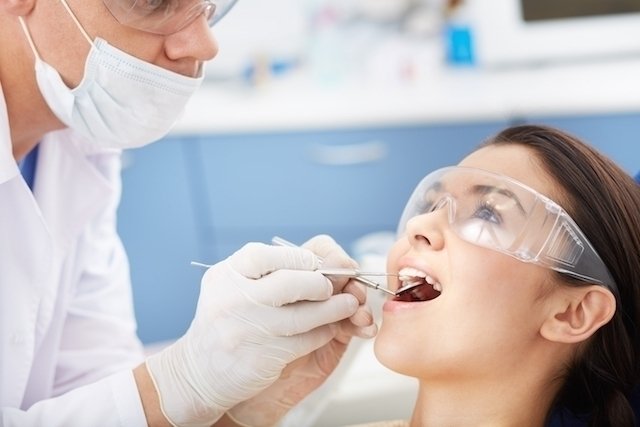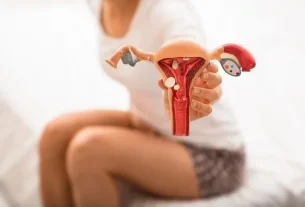During pregnancy, it is very important that women visit the dentist frequently in order to maintain good oral health, as they are more susceptible to developing dental problems, such as gingivitis or cavities, due to the hormonal changes characteristic of pregnancy.
Although going to the dentist is recommended, it is necessary to take extra care and avoid very invasive or prolonged procedures and the administration of certain medications.

Dental problems that can arise during pregnancy
Pregnant women are more susceptible to gum inflammation, due to the hormonal changes that occur during pregnancy. The hormones circulate in greater concentration, penetrating the tissues and passing into the saliva, making the tissues, particularly the gums, more sensitive to changes.
Progestins contribute to increasing the permeability of gum capillaries and reducing the immune response, and estrogens increase gingival vascularization, favoring bleeding, and increase the pH of saliva, favoring an increase in bacterial plaque.
In addition, changing eating times, eating between meals and acid erosion of the teeth caused by vomiting can also increase the risk of developing dental problems.
All of these factors create adverse conditions in the oral environment, which can lead to the appearance of:
1. Pregnancy gingivitis
Gingivitis is characterized by a bright red color of the gums, with a smooth and shiny surface texture, which may result in loss of elasticity and an increased tendency to bleeding, which is very common during pregnancy, affecting a large percentage of pregnant women.
Gingivitis usually appears in the 2nd semester of pregnancy and can progress to periodontitis if not treated, hence the importance of visiting the dentist. Find out how to identify the symptoms of gingivitis and how it is treated.
2. Granuloma of pregnancy
Granuloma consists of the appearance of asymptomatic thickenings of the gums, intense red in color and very easy to bleed.
These thickenings generally disappear after childbirth and should therefore be avoided by removing them through surgery. Only cases that present excessive bleeding or impairment of oral functions require surgery, preferably in the 2nd trimester.
3. Cavities
The changes that occur during pregnancy favor the appearance of cavities, which consist of an infection of the teeth caused by bacteria naturally present in the mouth, which perforate the tooth enamel, which can cause pain. Learn how to identify tooth decay.

Safe dental treatments for pregnant women
The ideal is to invest in prevention, maintaining good oral hygiene, and consulting the dentist frequently, in order to avoid the emergence of dental problems. If treatment is necessary, it may be necessary to take some care with regard to certain interventions or the administration of medications.
Can a pregnant woman receive anesthesia?
General anesthesia should be avoided, and local anesthesia should be preferred. Local anesthetics are safe throughout the pregnancy period, with no contraindications to their use, with the exception of mepivacaine and bupivacaine. Although they have the ability to cross the placental barrier, they are not related to teratogenic effects. The most commonly used anesthetic solution is 2% lidocaine with epinephrine.
Is it safe to have X-rays during pregnancy?
Radiation should be avoided during pregnancy, especially during the 1st trimester. However, if it is really necessary, care must be taken to avoid harming the baby, such as using a lead apron and using fast films to take the x-ray.
What medicines are safe during pregnancy?
Medication should only be used if absolutely necessary. In some cases, the use of antibiotics may be recommended to combat an infection, the most recommended being penicillin derivatives, such as amoxicillin or ampicillin. In case of pain, the dentist may recommend paracetamol, and anti-inflammatories should be avoided as much as possible, which are not recommended during pregnancy, especially during the 3rd trimester.
Is tooth restoration recommended for pregnant women?
In the 1st and 3rd trimester, dental treatments should be avoided, except in urgent cases. The 2nd semester is the one in which it is most appropriate to carry out treatments, avoiding major restorations or aesthetic treatments, avoiding waiting times and reducing consultation times. Furthermore, the pregnant woman should be in a position in which she feels comfortable.

¡Suscríbete a nuestro newsletter y mantente al día con novedades exclusivas que pueden transformar tu rutina!
Warning: Undefined array key "title" in /home/storelat/public_html/wp-content/plugins/link-whisper-premium/templates/frontend/related-posts.php on line 12
Warning: Undefined array key "title_tag" in /home/storelat/public_html/wp-content/plugins/link-whisper-premium/templates/frontend/related-posts.php on line 13



